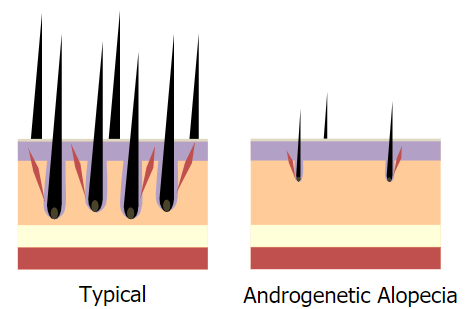Because hair supports our psychological and physiological well-being the importance of finding effective therapies for hair loss cannot be understated. There are several ways in which hair loss occurs, but for many affected individuals, male and female, androgenic Alopecia (AGA) is responsible. AGA is a Polygenic disorder which predisposes the individual to gradual or progressive hair loss, diminished size of terminal hair follicles, decreased thickness of hair strands and shortening of hair growth cycles in affected areas.

Hair presentation in those diagnosed with Androgenetic Alopecia, the Hair is less dense and terminal hairs are smaller in size.
Individuals with this genetic condition will notice hair shedding (also termed effluvium) and less dense hair in specific locations on their scalp, usually at an early age (near puberty). For most males affected by AGA an androgen protein receptor is altered which changes the sensitivity of hair follicles to androgen, inhibiting growth. Balding areas also contain more androgen receptors than non balding areas making them more genetically susceptible to AGA. In addition, the enzyme 5α-reductase, which converts the hormone testosterone to dihydro-testosterone or DHT, is increased in AGA susceptible regions.
There is no connection between lifestyle and this specific ailment, and it is not directly dangerous to physical health. It is essential for those beginning to notice consistent hair loss or receding hairlines to have an accurate diagnosis of cause prior to looking for treatment, as this depends on your specific situation and medical background. In addition, for many of the treatments detailed here it is imperative to begin as early as safely possible in order to increase the efficacy or usefulness of the therapy.


